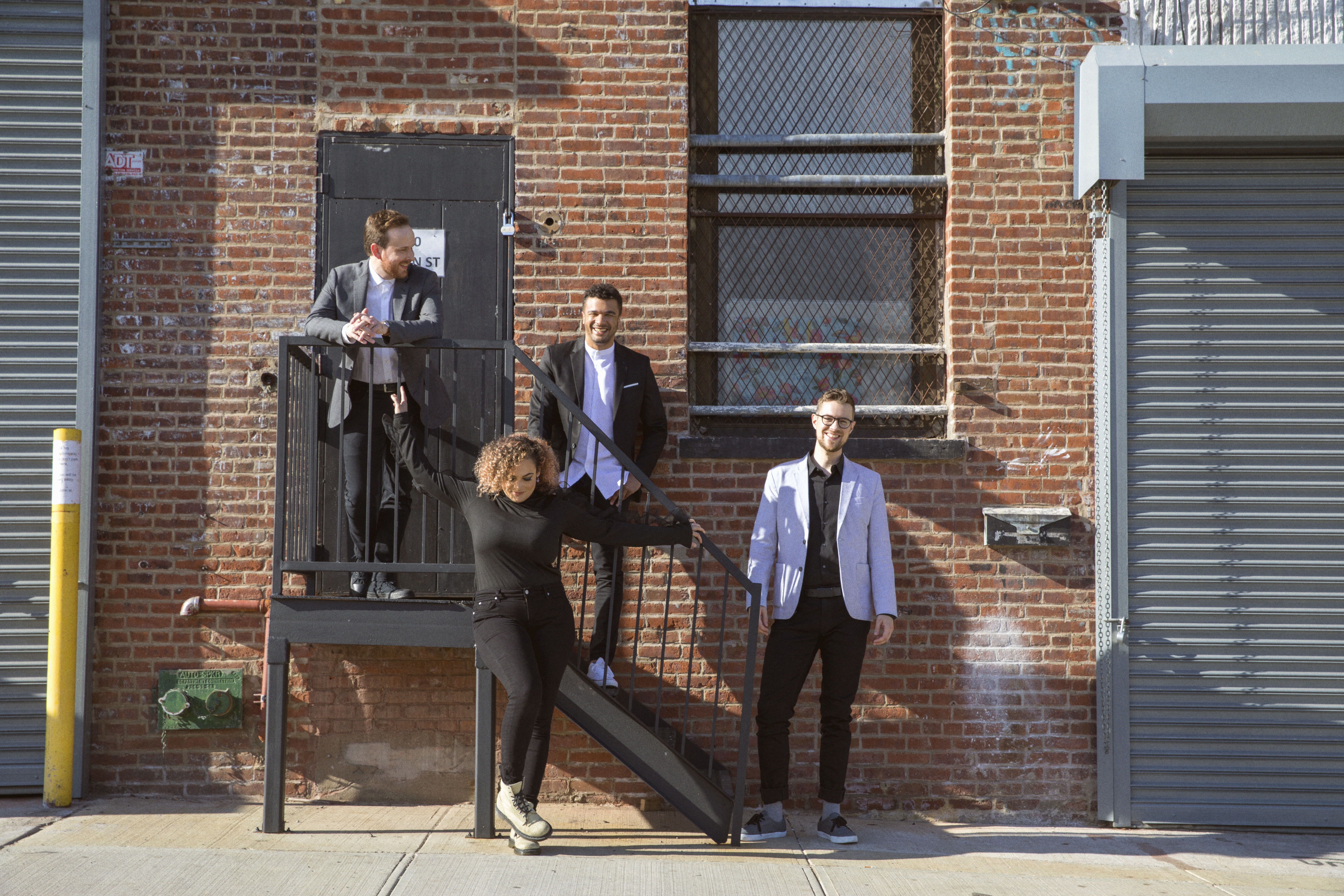Transcendent Chamber Music for Transcending Genre
Review of PUBLIQuartet at Town Hall Seattle
Written by Teen Writer Audrey Gray and edited by Teen Editor Disha Cattamanchi

A string quartet is precisely the kind of musical act you’d expect to see at a place like Town Hall Seattle. Being a converted 20th century church, their Great Hall has a charming feel about it; people file past stained-glass windows, and slide into church pews with the chatter of any other audience. PUBLIQuartet was the string ensemble about to play that night in the Great Hall, with members Curtis Stewart, Jannina Norpoth, Nick Revel, and Hamilton Berry all taking their seats. The contemporary group advertised their sound as “dynamic, genre-bending chamber music,” a claim just as ambitious as their piece selections for the evening, which included an intriguing array of improvisations based on pieces composed by Ornette Coleman, Tina Turner, Alice Coltrane, and Antonín Dvořák. The stage dressing was simple; with only four seats, it lacked anything showy. Yet from the very beginning of PUBLIQuartet’s performance, from the hushed silence right before the first note was drawn, it became evident that they weren't just there for a good time. They were there to say something powerful.
In their first Seattle performance, PUBLIQuartet chose to play pieces from their upcoming album What is American. The work explores issues of identity and belonging in this country, using improvisations of well-known American compositions to expand on the power of music’s diverse history. American born-and-bred genres such as rock, funk, and jazz are used to represent the nuanced title, with genre musicians taking prominent positions in the album’s influences. The group performed renditions of contemporary works by Vijay Iyer, and improvised on Dvořák’s “American” Quartet, a popular chamber music composition influenced by the Indigenous and Black American music Dvořák encountered while in the United States. These compositional choices reflect most heavily the influence of Black music on America’s musical culture as a whole.

With this blend of influences and the added challenge of improvisation, how did PUBLIQuartet connect the dots between seemingly disparate works tied loosely with a label of “American”? It was an incredibly daunting prospect, but PUBLIQuartet surprised me; they made it seem effortless.
Every part of the performance was done masterfully. The group’s selections were tied together with a common thread of artistic reflection, which was accomplished within their improvisations by musically reiterating the similarities between the pieces. They included repeated motifs and rhythmic elements throughout their selections, giving their own commentary on the inspiration behind their reworked source material. By the end, PUBLIQuartet’s selections seemed so well-conceived that I wanted to experience them all over again, just to try to understand them a bit better.
The most magical thing about their compositions was the layered effect. The group balanced musical elements of rhythm, harmony, and melody within their pieces, so there were always several layers of sound, each accomplished with different instruments. In this way, no instrument went to waste—not even a single note. Every moment of the performance was taken up with a perfect blend of the violins, cello, and viola, but never in a way that felt old, repetitive, or dull. The musicians improvised so well with each other that the music never lost its depth, even as the group transitioned between different tones, genres of influence, and techniques. Unorthodox vocal and drumming techniques were layered on top of melodic elements and subtler harmonies, contributing to the distinct impression of PUBLIQuartet’s unique musical identity. Even as the musicians shifted back and forth from atmospheric interpretations of their source material to frenetic and dynamic moments, there was never a dull moment.
PUBLIQuartet’s pure skill and flawless musical layering were not the only impressive aspects of their performance. Their thoughtfulness, passion, and mastery laid heavily upon the audience, and their music lingered with a deep understanding. Alice Coltrane’s music was interpreted with a soulful and somewhat strange spirituality, incorporating both the original artist’s depth and PUBLIQuartet’s unique style. The improvisations on Fats Waller’s Honeysuckle Rose also painted a vivid cityscape with unconventional rhythmic elements. It added a layer of story to the original song, by reimagining it within the context of the life of Madam C.J. Walker, the first female self-made millionaire in America.
PUBLIQuartet's overarching enthusiasm and powerful interpretations tied every exemplary aspect of their performance together. If you closed your eyes as they played, their sound was defined by the fluidity, movement, and dynamism of their composition. PUBLIQuartet’s music was transformative, beautifully atmospheric, effortlessly exciting, and unlike any string quartet I’ve ever heard before. It was a lapse from genre-based confines for the ages.
PUBLIQuartet played at Town Hall Seattle on December 6, 2021. For more information see here.
Lead photo credit: PUBLIQuartet, photo by Lelaine Foster
The TeenTix Newsroom is a group of teen writers led by the Teen Editorial Staff. For each review, Newsroom writers work individually with a teen editor to polish their writing for publication. The Teen Editorial Staff is made up of 6 teens who curate the review portion of the TeenTix blog. More information about the Teen Editorial Staff can be found HERE.
The TeenTix Press Corps promotes critical thinking, communication, and information literacy through criticism and journalism practice for teens. For more information about the Press Corps program see HERE.

